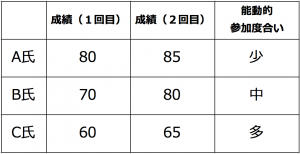Offerings will naturally increase for students who give opportunities for fairness and equality and are highly motivated to do so.On the contrary, it is difficult to give the same amount of offerings to students who are not motivated even though they have been given the same opportunity, and attempts to give the same offerings are motivated. On the contrary, it can be said that it becomes unequal to high-ranking students.In the past, in the field of education, there was even a general stance of being obsessed with equality in a superficial sense, and perhaps matching the abilities and motivations of the average student. In AL, taking such a stance may immediately reduce the motivation of highly motivated students.
So what can we say when we look at AL not in terms of opportunities but in terms of evaluations and results?Let's assume that there are three students, A, B, and C. Mr. A has the best grades of the three, but he is not motivated. Mr. B is more motivated than Mr. A, but not as much as Mr. C.However, it is the fastest growing of the three. Mr. C is very motivated, but unfortunately he is not happy with his grades.
Of course, if you want to evaluate your grades regardless of AL, Mr. A will be able to get the best grades.It is the easiest to understand, and in a sense (meaning fairness of results), it can be said to be equal.On the other hand, if AL is defined as "participation of learners in active learning", it is no wonder that they want to reflect the degree of participation in lectures in their grades.Then, should Mr. C be the first?Many high school and university teachers seem to be suffering from such problems.
I have not yet found a clear answer to this question.If possible, I don't want to give "certification credits" and further subdivide my grades.In fact, the true intentions of many teachers may be similar.
However, the author has one particular preference.That is, if the results shown in the above table are obtained, it should be considered that the skills and abilities of the teachers who perform AL were poor.Why?This is because in advanced AL, the motivation of students and the degree of growth should be correlated.In other words, in the above table, if Mr. C was able to grow the most, it can be said that the lecture was a success.However, if Mr. C is inferior in both the result (XNUMXnd time) and the degree of growth (XNUMXnd-XNUMXst time), Mr. C's motivation may eventually decline.If such a situation has occurred, it may be the responsibility of the teacher.
Of course, it is undeniable that the results will differ depending on the qualities and abilities that the person had in the first place.However, if the growth is poor despite active participation, what is the reason for the student to have an active attitude?The author's view is that if a student is required to participate in active learning, such participation must be ensured to be successful.


